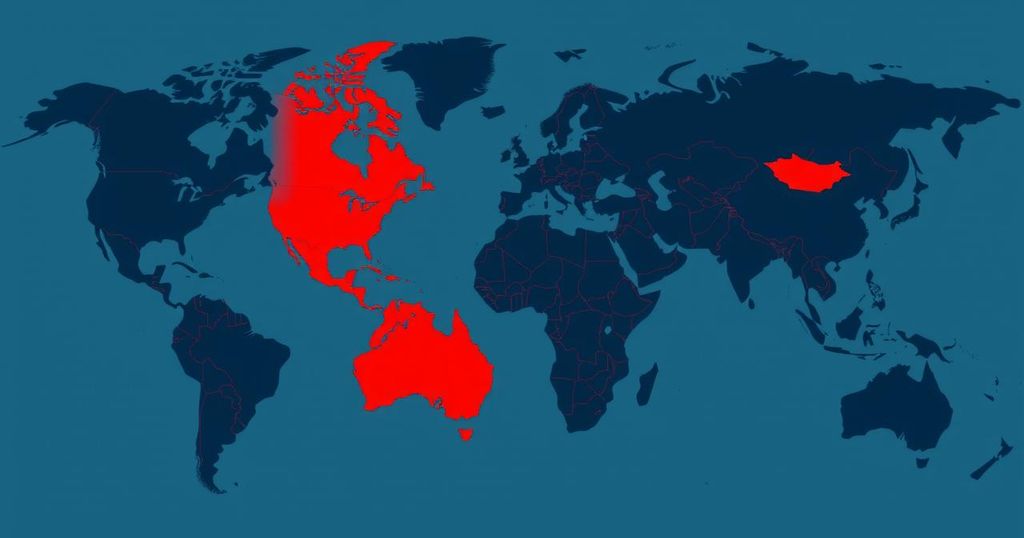Australia’s government has issued Do Not Travel warnings for Russia, North Korea, Venezuela, Haiti, Iran, Myanmar, Sudan, Syria, Ukraine, and Libya due to severe risks associated with conflict, terrorism, and civil unrest. These warnings reflect a significant downturn in tourism and safety concerns, emphasizing the impact of geopolitical instability on the travel industry globally.
Australia has issued Do Not Travel warnings for ten countries—Russia, North Korea, Venezuela, Haiti, Iran, Myanmar, Sudan, Syria, Ukraine, and Libya—due to serious threats including armed conflict, terrorism, civil unrest, and arbitrary detention. These warnings, which originate from the Department of Foreign Affairs and Trade (DFAT) via their Smartraveller portal, indicate grave security risks for Australian travelers and present a daunting setback for any potential tourism recovery in these regions.
The circumstances prompting these advisories reveal the precarious state of safety in affected countries. For instance, Australians are advised to leave Russia expeditiously due to a heightened risk of arbitrary detention, hostility towards foreigners, and threats of terrorism. The tourism sector in Russia has effectively collapsed, as foreign presence now invites scrutiny and peril.
In North Korea, the closure of its borders has resulted in an indefinite suspension of tourism. Given that the government tightly controlled tourism in the past, the current restrictions have rendered travel to this country virtually nonexistent, with little prospect for future recovery.
Venezuela continues to grapple with instability, marked by violent crime and acute shortages of essential supplies. Sudden demonstrations often escalate into violence, thus making travel exceedingly dangerous and limiting tourism infrastructure.
Haiti is experiencing a nationwide State of Emergency due to rampant gang violence, which has severely impacted transportation hubs, with major airlines halting flights and border crossings with the Dominican Republic unusable. The urgent evacuation of travelers has become paramount amidst prevalent violent crime.
In Iran, existing tensions have sparked concerns over military actions and civil unrest, leading to a recommendation against travel. The formerly burgeoning cultural tourism sector is now regarded as too hazardous for safe visitation.
Ongoing armed conflict and unrest also plague Myanmar, where tourism has diminished sharply since the 2021 military coup, creating a stagnant and perilous situation for any potential visitors. Similarly, Sudan faces escalating violence, leaving Australians with limited options for safe exit amid its civil unrest, effectively curtailing tourism.
Syria, labeled one of the world’s most dangerous travel destinations, suffers from severe airstrikes and high civilian casualties. All forms of travel to Syria are deterred as terrorist groups remain active and tourism infrastructure is in ruins.
The conflict in Ukraine poses significant dangers due to military operations and presence of unexploded ordnance. With the tourism sector halted entirely, the risks of travel are notably high.
Libya remains unstable, with terrorism and kidnappings creating an unsafe environment. Australians are advised to exit the area promptly if conditions permit, as consular support is largely absent.
This comprehensive travel advisory for these ten countries reveals a growing global trend where geopolitical instability influences tourism. Consequently, travelers and tour operators must recalibrate their assessments of destination safety, infrastructure, and risk management. Furthermore, travel insurance becomes invalidated in such countries, and consular assistance is often minimal or nonexistent, forcing a reconsideration of all travel intentions.
Ultimately, Australia’s Do Not Travel warnings underscore the fragility of the global tourism sector in the context of deepening conflict. The ongoing crises hinder any prospect for the safe return of tourism, leaving both travelers and local communities suspended in uncertainty.
The Australian Government’s Do Not Travel warnings for ten nations illustrate the significant impact of geopolitical turmoil on global tourism. The outlined safety risks lead to an effective cessation of tourism activities and underscore a crisis in potential recovery efforts. This situation compels travelers and industry professionals to reevaluate their approaches, highlighting the essential need for safety and stability in promoting international travel. As conflict persists, the hope for revitalizing tourism in these affected regions remains bleak, with both travelers and local economies caught in a prolonged state of limbo.
Original Source: www.travelandtourworld.com






